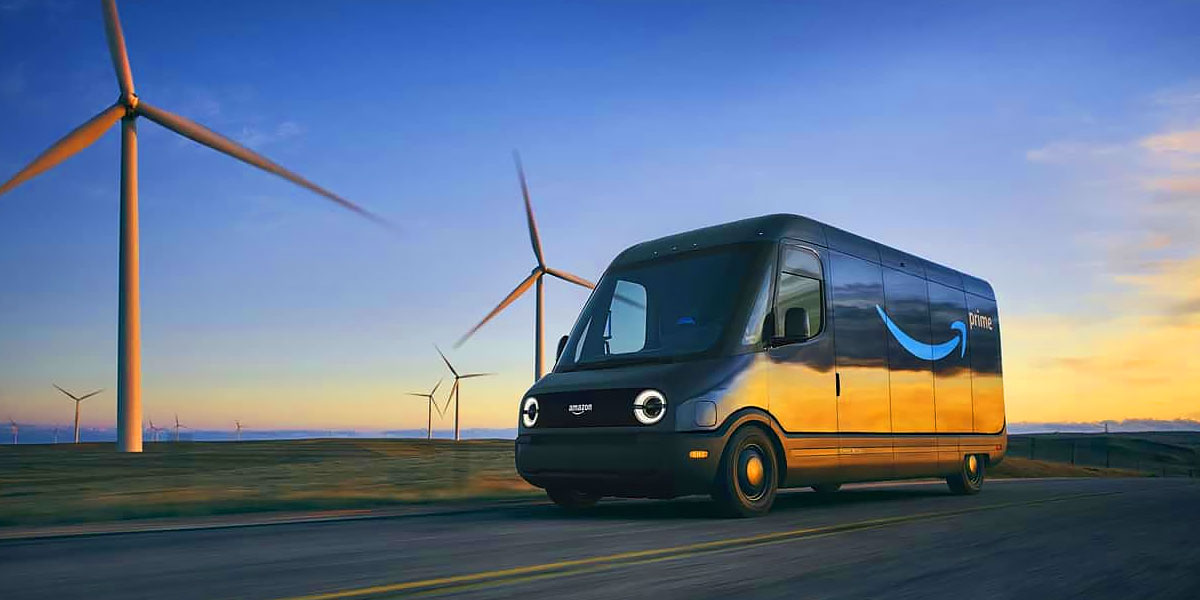Rivian EDV
The Rivian EDV is an all-electric delivery van with 320 hp, a 135 kWh LFP battery, 240 km (149 mi) range, and 1,200 kg (2,646 lbs) cargo capacity. Launched in 2021 and priced from $86,000 (€79,980), it’s optimized for urban fleet efficiency.
User Rating: 3 / 5 (27 votes)





Base Trim Price: $86000 USD *
| truck type | delivery van |
| manufactured in | USA |
| model year | 2021 |
| range (km) | 240 |
| speed (km/h) | 120 |
| power (hp) | 320 |
| battery (kWh) | 135 |
| cargo capacity (kg) | 1200 |
| drive type | AWD |
* Minimum price set for the base trim by the manufacturer

Exterior and Interior photos of Rivian EDV
Rivian EDV Review
EDV 2021: Rivian's Silent Workhorse for Smarter Urban Logistics
For city fleets aiming to ditch diesel without sacrificing payload or power, the Rivian EDV hits the sweet spot. Introduced in 2021 and built in the USA, this all-electric van delivers purpose-driven functionality with a dose of comfort usually reserved for luxury EVs. With Amazon as its first big customer and more fleet operators joining the fold, the EDV is quickly setting the standard for what an electric delivery van should be.
- Launched in 2021, the Rivian EDV was developed with Amazon and built in the U.S. for last-mile delivery precision.
- Starting at $86,000 (€79,980), it balances high capacity, smart tech, and low emissions for modern fleets.
- Variants include EDV-500, EDV-700, and EDV-900, each offering increasing levels of cargo volume and capability.
EDV Specs: Built to Deliver Without the Noise
Battery
Under the flat floor lies a 135 kWh LFP battery—ideal for daily route repetition and minimal degradation. With a max range of 240 kilometers (149 miles), the EDV comfortably covers a full city workday. DC fast charging at 100 kW tops up 86 miles in an hour, while AC charging via 240V keeps it simple overnight.
- Battery Capacity: 135 kWh (LFP)
- Range: 240 km (149 mi)
- Charging: DC Fast 100 kW (86 miles/hour), 240V AC overnight
Performance
Don’t let the van profile fool you—the EDV churns out 320 horsepower (239 kW) and 299 lb-ft (405 Nm) of torque. Top speed sits at 120 km/h (75 mph), optimized for city and suburban routes. While it’s not a drag strip demon, it’s got more than enough oomph to keep things moving when fully loaded.
- Power Output: 320 hp (239 kW)
- Torque: 299 lb-ft (405 Nm)
- Top Speed: 120 km/h (75 mph)
- Drive Type: All-Wheel Drive (AWD)
All models share a steel ladder-frame platform, absorbing the hits and bumps of daily urban grind with ease.
Exterior and Interior: Utility Outside, Comfort Inside
Exterior
The EDV may look friendly, but it’s tough. Black bumpers, reinforced panels, and that signature short nose all serve a purpose: better visibility, tight turns, and damage control. Depending on model, cargo volume ranges from 478 to 652 cubic feet—ideal for Amazon-style payloads with frequent stops.
Interior
Step in and it’s clear Rivian thought about the driver. Heated seats, wide step-in access, and a huge central screen make it easy to stay productive and comfortable. The infotainment system doubles as a dispatch screen, and a training-mode folding seat shows Rivian’s fleet-first mindset.
Pros and Cons of the Rivian EDV
Pros
- Large 135 kWh battery with solid 240 km (149 mi) range
- High-tech interior with intuitive fleet integration
- 1,200 kg (2,646 lbs) payload capacity for lightweight, high-volume cargo
- Comfortable for long shifts with premium touches
- Fleet-ready with diagnostics, tracking, and route optimization
Cons
- Range not ideal for long rural deliveries
- High floor height could challenge some loading operations
- No dual-motor variant yet for added traction
- Price may be steep for smaller operators
- Availability still focused on major clients like Amazon
Conclusion: Rivian’s EDV Is Built to Work, Not Just Impress
Forget the hype around luxury EVs—the EDV gets down to business. With its smart build, fleet-ready software, and endurance-first design, it’s already changing how the delivery world operates. If your logistics team needs a future-proof hauler that doesn’t slack on comfort or cargo, the Rivian EDV deserves a long look.
Watch the Video Overview
Full Specifications List:
Model Specs
| Specification | Actual Data |
|---|---|
|
Model
|
Rivian EDV
|
|
Model Year
|
2024
|
|
Manufacturer
|
Rivian Automotive
|
|
Manufactured In
|
USA
|
|
Vehicle Class
|
Electric Delivery Van
|
Performance
| Specification | Actual Data |
|---|---|
|
Power Type
|
Full Electric
|
|
Powertrain
|
Dual Motor Electric Drivetrain
|
|
Drive Type
|
AWD
|
|
Maximum Power Output
|
320 hp - 239 kW
|
|
Maximum Torque
|
560 Nm - 413 lb-ft
|
|
Maximum Speed
|
120 km/h - 75 mph
|
Battery and Charging
| Specification | Actual Data |
|---|---|
|
Battery Type
|
Lithium Ion
|
|
Battery Capacity
|
135 kWh
|
|
Nominal Voltage
|
400 V
|
|
AC Charging Power
|
11 kW
|
|
DC Fast Charging Power
|
150 kW
|
Estimated Range Data
| Specification | Actual Data |
|---|---|
|
EPA Estimated Range
|
480 km - 300 miles
|
Body Specifications
| Specification | Actual Data |
|---|---|
|
Length
|
6,300 mm - 248.0 in
|
|
Width
|
2,400 mm - 94.5 in
|
|
Height
|
2,800 mm - 110.2 in
|
|
Gross Vehicle Weight Rating
|
4,536 kg - 10,000 lb
|
Exterior Design Features
| Specification | Actual Data |
|---|---|
|
Body Style
|
Step van delivery body
|
|
Sliding Doors
|
Large sliding side door
|
|
Lighting
|
Full LED exterior lighting
|
Interior Design and Materials
| Specification | Actual Data |
|---|---|
|
Seating Configuration
|
2 seats
|
|
Upholstery
|
Commercial grade materials
|
|
Cabin Focus
|
High efficiency last mile delivery
|
Cabin Technical Features
| Specification | Actual Data |
|---|---|
|
Driver Display
|
Digital instrument cluster
|
|
Infotainment
|
Central touchscreen interface
|
|
Connectivity
|
Rivian fleet management platform
|
|
Driver Assistance
|
Advanced safety and driver assistance systems
|
F.A.Q. about Rivian EDV
What is the range on a single charge?
The Rivian EDV offers up to 240 km (149 miles) of real-world electric range from its 135 kWh LFP battery.
How long does it take to fully charge?
DC fast charging at 100 kW adds 86 miles in one hour. Standard 240V AC charging replenishes the battery overnight.
What is a battery capacity?
Battery capacity indicates stored energy. The EDV features a 135 kWh lithium iron phosphate battery for daily reliability and long cycle life.
What is the price of a EDV?
The Rivian EDV starts at $86,000 (€79,980), designed for commercial fleet use with tech and comfort baked in.
What is top speed?
The EDV reaches a top speed of 120 km/h (75 mph), suitable for most city and suburban delivery routes.
What is total power?
With 320 hp (239 kW) and 299 lb-ft (405 Nm) of torque, the EDV provides strong off-the-line pull for loaded routes.
How much cargo can it carry?
The EDV has a payload capacity of up to 1,200 kg (2,646 lbs) with cargo volume between 478–652 cubic feet depending on model.
Can the EDV handle high daily mileage?
Yes, its large battery and robust design are optimized for repetitive urban routes, minimizing downtime and maintenance.
What kind of fleet tools are integrated?
The EDV includes Rivian’s fleet software with route tracking, vehicle diagnostics, and driver behavior monitoring built in.
Is the Rivian EDV available to the public?
While initially limited to Amazon’s fleet, Rivian is expanding EDV availability to commercial clients across the U.S.
Comparison:
The Rivian EDV takes on heavyweights like the Chevrolet BrightDrop, Mercedes-Benz eSprinter, Ford E-Transit, and Canoo MPDV in the electric fleet segment. Each contender serves a unique slice of the logistics pie, but which one checks the most boxes for daily fleet operations?
Range
The EDV delivers 240 km (149 mi) of range—better than E-Transit (203 km / 126 mi) and Maxus eDeliver 3 (227 km / 141 mi), but shorter than BrightDrop (435 km / 270 mi) and eSprinter (331 km / 206 mi). It’s well-suited for daily city loops but not long hauls.
Acceleration
At 320 hp, the EDV leads most rivals in power. BrightDrop sits at 300 hp, eSprinter at 201 hp, and Ford E-Transit at 266 hp. Canoo trails with around 200 hp. For stop-and-go delivery driving, the EDV's torque gives it a snappy edge.
Power
The EDV's 320 hp and 299 lb-ft (405 Nm) of torque dominate most of its class. BrightDrop follows closely with 300 hp and 390 lb-ft, while eSprinter and E-Transit are tuned for lighter loads. Canoo offers less grunt but lower curb weight.
Charging Time
The EDV supports 100 kW DC fast charging—adequate, but slower than BrightDrop (200 kW). eSprinter (115 kW) and E-Transit (115 kW) slightly edge it out. Canoo's numbers remain tentative. For urban depots, overnight AC charging keeps it rolling daily.
Price
At $86,000 (€79,980), the EDV is pricier than E-Transit ($51,000 / €47,300) and eSprinter ($63,475 / €59,031), but undercuts top BrightDrop trims. Canoo teases a $45K base, but lacks widespread availability. The EDV justifies its price with performance, comfort, and tech.















